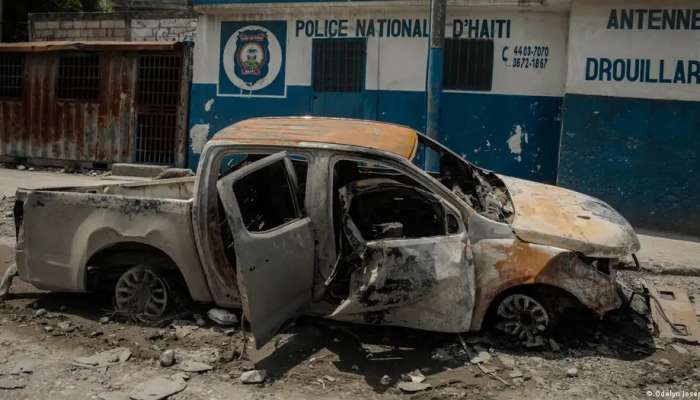
Port-au-Prince: UN Secretary-General Antonio Guterres visited Haiti on Saturday, seeking to highlight the various crises faced by one of the world's poorest countries as it struggles to combat violent gangs that have largely overrun the capital Port-au-Prince.
"I'm in Port-au-Prince to express my full solidarity with the Haitian people and call on the international community to continue to stand with Haiti, including with a robust international force to assist the Haitian National Police," Guterres said on Twitter, in English and then in French. "This is not the time to forget Haiti."
It's his first trip to the country as UN chief.
Guterres backed a request from Haiti's government for an international "rapid action force" to support local security services almost nine months ago. No such force has yet been deployed with no country volunteering to take the lead.
Guterres had told the UN in April that he saw the situation in the country as "comparable to countries in armed conflict" and said that "no commune is now spared from gang-related turf wars."
Lawless Port-au-Prince long in focus
Criminal gangs have held at least partial control of the capital for some time, and came into particular focus last September when they blocked a fuel terminal for six weeks, halting most economic activity.
The UN issued sanctions against Haiti's most power gangster in October, who was accused of leading the blockade. The US and Canada also followed up with sanctions on Haitian political and business figures.
As well as the ongoing armed challenge to authorities in the impoverished Caribbean country, flash floods in June brought fresh chaos to the capital, which never really recovered from an enormous 2010 earthquake, estimated to have killed at least 100,000 people.
Henry's government at root of international hesitancy?
Several other crises and conflicts have arguably served to detract attention to Haiti in the last year or so, not least Russia's invasion of Ukraine, but also a series of conflicts and coups in Africa, among others.
Although various countries have voiced support in theory for an international mission, none have volunteered to lead it.
This may be because countries are wary of supporting the unelected government of Prime Minister Ariel Henry. Henry has said fair elections cannot be held amid the current insecurity. Haiti has had no elected representatives since January.
Henry took power in July 2021, days after the assassination of elected President Jovenel Moise. The circumstances of Moise's death remain mysterious, the government holds a group of foreign mercenaries — mostly from Colombia but also including people who were based in the US or Canada — responsible.
Moise's widow, who was injured but survived the attack, is pursuing the case in US courts.
Henry has repeatedly delayed plans for elections aiming to restore democratic rule since taking power. First he cited an August 2021 earthquake in the west of Haiti, which killed around 2,000 people, and later the gang violence in Port-au-Prince and beyond.
Long-suffering Haitians also wary of international troops
According to figures from the UN refugee agency, roughly 73,500 people fled Haiti last year. Some 5.2 million Haitians, around half the country's population, need humanitarian assistance in 2023. A UN appeal seeking $720 million (roughly €700 million) in funds for Haiti this year is currently only 23% funded.
Haitian people also retain some reservations about international peacekeeping missions. In 2010, not long after the disastrous major earthquake with its epicenter near the capital, the country was free of cholera.
But UN peacekeepers — some of whom hailed from countries where the disease was still endemic — dumped infected sewage into a river near a barracks, which then led to more than 9,000 deaths and hundreds of thousands of cases in a major outbreak, according to UN estimates.